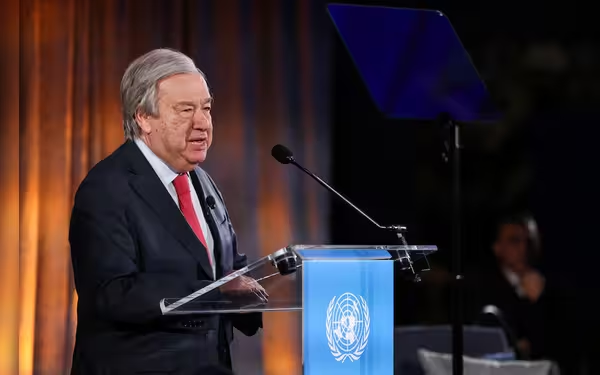Saturday, November 16, 2024 07:27 PM
UN Chief Guterres Urges Immediate Action on Climate Adaptation
- UN calls for urgent climate adaptation strategies.
- Funding gap for climate adaptation remains critical.
- Rich nations pressured to fulfill climate action commitments.
 Image Credits: arabnewspk
Image Credits: arabnewspkUN Chief Guterres emphasizes urgent need for climate adaptation amid significant funding gaps.
Climate change has emerged as one of the most pressing challenges of our time, affecting every corner of the globe. As temperatures rise and extreme weather events become more frequent, the need for effective adaptation strategies has never been more critical. Recently, UN Secretary General Antonio Guterres emphasized the urgency of this issue, stating that the world is ill-prepared for the "calamity" caused by climate change. His remarks came during the launch of the UN Environment Programme's (UNEP) annual Adaptation Gap Report, which highlights the significant gap between the funding needed for climate adaptation and what is currently being provided.
According to Guterres, global efforts to adapt to climate change—such as constructing sea walls to protect against rising sea levels and developing drought-resistant crops—are lagging behind the accelerating impacts of global warming. The report indicates that floods, fires, and other climate-related disasters have affected nearly every continent, with 2022 potentially being the hottest year on record. Alarmingly, the financial support directed towards poorer nations for adaptation measures is only a fraction of what is required. UNEP's assessment reveals that these countries received merely one-tenth of the estimated $215 billion to $387 billion needed annually for effective adaptation.
Rich nations are facing increasing pressure to fulfill their commitment of providing $100 billion for climate action in developing countries, particularly for adaptation efforts. However, many donor governments are grappling with their own fiscal and political challenges, making substantial new commitments unlikely at the upcoming UN COP29 summit in Azerbaijan. This situation is further complicated by the recent failure of a UN biodiversity meeting to reach a funding agreement and the looming uncertainty surrounding global climate cooperation, especially with the potential return of Donald Trump, who has historically opposed such initiatives.
Despite a slight increase in public finance for climate adaptation—amounting to $28 billion in 2022—this figure remains a drop in the ocean compared to the vast needs of developing countries. UNEP has warned that even if rich countries double their contributions to approximately $40 billion by 2025, there will still be an "extremely large" funding gap for adaptation efforts. The consequences of climate disasters disproportionately impact the poorest communities, but the cost of inaction is now being felt by all nations.
As Patrick Verkooijen, CEO of the Global Center on Adaptation, pointed out, the effects of climate change are universal, affecting every nation and community. From rising sea levels to extreme heat waves, the impacts are undeniable and require immediate action. Guterres' call to action is clear: "We can’t postpone protection. We must adapt – now." This statement serves as a reminder that the time for discussion has passed; the world must act decisively to protect vulnerable populations and ecosystems.
The message from the UN is loud and clear: adaptation to climate change is not just an option; it is a necessity. As we face an uncertain future, it is imperative that nations come together to bridge the funding gap and implement effective strategies to safeguard our planet. The stakes are high, and the time to act is now. Every effort counts, and collective action can make a significant difference in building a resilient future for all.













